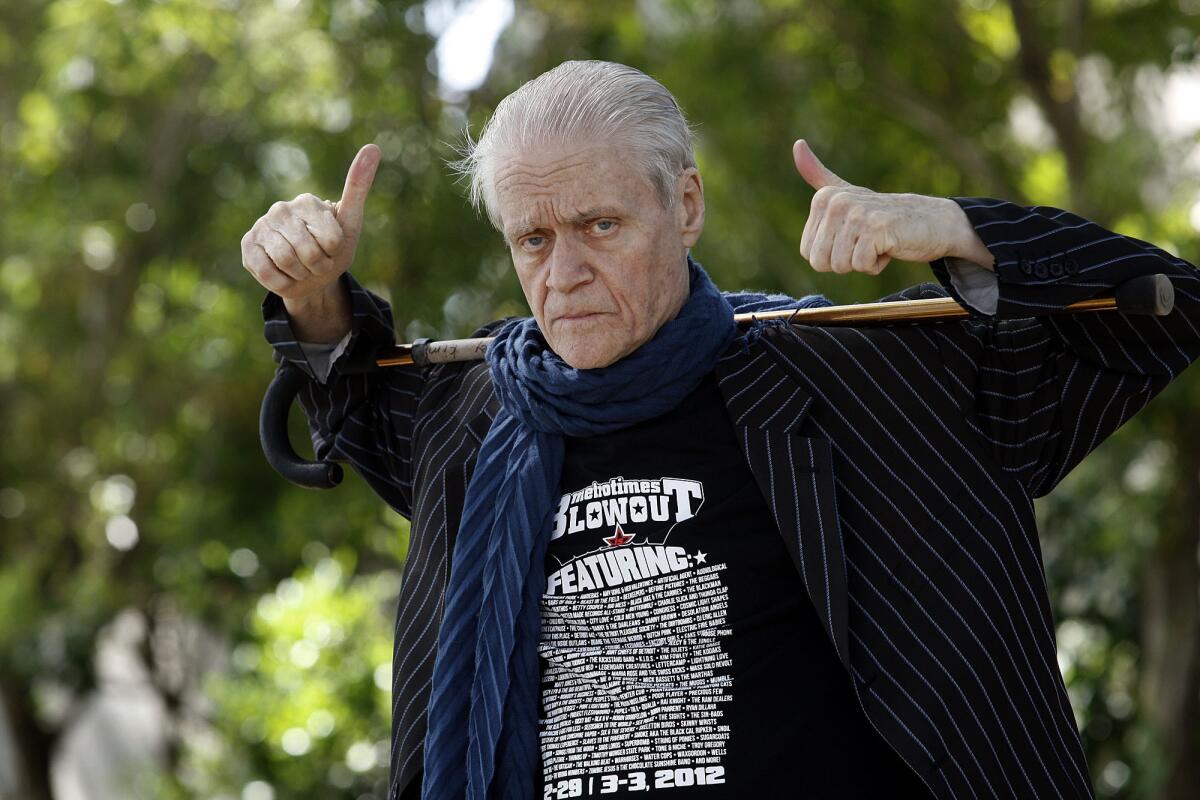Appreciation: Kim Fowley rocked industry as a salesman of sounds

- Share via
Those looking to understand Kim Fowley’s philosophy of rock ‘n’ roll salesmanship can get a sense by how he described hawking songs here in the early 1960s, when he was racing through the city as a twentysomething hipster/huckster looking to make a mark.
Fowley, who died on Thursday at age 75, was speaking to writer Barney Hoskyns for his essential book on Los Angeles pop music, “Waiting for the Sun.” Recalling his early years in what Hoskyns dubbed the “capitalism a go-go” music scene at the dawn of the rock ‘n’ roll era, Fowley described thriving at the epicenter of the ultimate seller’s market.
“You could sell any tape for $100, and there was no playing clubs for guys in suits,” Fowley told Hoskyns, his recollections peppered with a particular unprintable cuss. “We were kids running amok in studios like rappers do now, except the rappers have attorneys. We were all thieves — there was no [expletive] … about art or integrity or sensitivity. People were willing to pay us to do … and keep doing it, and we were addicted to the process.”
The songwriter, producer, talent scout and charismatic symbol of Los Angeles musical weirdness used that process to build a memorably anarchic body of work. Many were novelty hits, a few great, others either forgettable or downright terrible. Most infamously, Fowley formed the all-girl rock band the Runaways, a relationship that delivered fame and success for the band while confirming Fowley’s avowed sleaziness. The band’s Cherie Currie, for example, accused him of holding a “sex education class” for some of the teen girls — a charge Fowley denied. (Currie and Fowley later reconciled.)
On a larger scale, Fowley helped birth a certain hipster archetype that endures to this day: the tapped-in, super-clever kid who understands youth culture and is keen on getting in on the action. Fowley was a connector looking for the next big thing, who exuded cool in any room. He had a taste for loose, raucous rock ‘n’ roll and a confidence that he was right, even if his discography offers ample evidence of his many commercial failures.
Fowley reveled in being the bad guy. His business model was similar from the start: Record music using unknown bands in by-the-hour studios and then pawn the songs. If it didn’t hit, discard the band and song and try again. Indie labels were desperate for records to feed the dozens of independent Southern California distributors shipping product across America. Kids were crazy for 45s, and the music that filled them had to come from somewhere.
Throughout, Fowley bottled a wild mix of rebelliousness, especially in the ‘60s and ‘70s. Of the hundreds he had a hand in, he peddled songs about a student’s coy come-on to a sexy teacher (“Hello Teacher,” by the Four After Fives); an instrumental guitar ode to underwater life, “Atlantis,” replete with the sound of bubbles floated through water; “Big Fat Alaskan” as recorded by Donnie & the Outcasts, a first-person ditty about said northerner, one who rides a polar bear and wears a black seal coat but can’t stand the cold so is moving to California.
Many of Fowley’s solo records remain as mysteriously engaging now as when they came out. He had odd creative reflexes. (Some of his best early songs and productions can be found on Norton Records’ excellent multi-volume series of Fowley’s work, aptly called “One Man’s Garbage.”)
He chased trends his entire life, his lanky frame moving from the early Southern California surf scene through the British Invasion and leading the parade for the Sunset Strip sound of the mid-1960s. As singular as he was fashionable, Fowley was fab during the Byrds years, ran and recorded with Frank Zappa and served as MC in a John Lennon-produced “rock ‘n’ roll revival.” The artist went glam during the Bowie years, wrote hits for KISS, pushed new wave when it mattered. Most recently, Fowley served as muse and advisor to kindred spirit Ariel Pink on the latter’s “Pom Pom.”
He exaggerated history and his role in it, and his competitiveness knew no bounds. Longtime music mogel Lou Adler described to Hoskyns a particular encounter with Fowley: “I once made him open up his suitcase, and there was nothing in it, which sums him up.”
In “Queens of Noise,” her biography of the Runaways, Evelyn McDonnell called Fowley “an appalling character. That appall is part of his appeal.”
Fowley agreed. “I’m everybody’s worst nightmare and somebody’s wet dream. I’m a horrible human being with a heart of gold, or a piece of … in a bag of diamonds. I’m a bad guy who does nice things, as opposed to a nice guy who does bad things.”
Those claims may be accurate, but who ever said rock ‘n’ roll was pretty? It certainly wasn’t the man who, in 1967, released “The Worst Record Ever Made,” which featured Fowley in front of the microphone pondering terrible music along with a group called Althea & the Memories.
Midway through, after suggesting a dance called “the wheelchair,” Fowley goes meta, complaining about screaming into a microphone for the length of a song. “It’s pretty hard,” he says before listing a pair of truths that guided him: “It shows how desperate we all are. And it shows how desperate you are to be listening to this.”
Twitter: @LilEdit
More to Read
The biggest entertainment stories
Get our big stories about Hollywood, film, television, music, arts, culture and more right in your inbox as soon as they publish.
You may occasionally receive promotional content from the Los Angeles Times.











